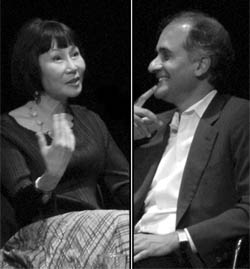Channeling Mama
Amy Tan in conversation with Pico Iyer.
Before her appearance last week in Santa Barbara, Amy Tan said the opportunity for a conversation with Pico Iyer was what made the invitation so appealing. It’s hard to see who wouldn’t want to sit and talk with the thoughtful and soft-spoken Iyer, whose warm introduction of Tan set her alongside Steinbeck, Fitzgerald, and Hemingway as the author of one of the great American Novels-The Joy Luck Club. “I hardly recognize myself,” Tan said when he was through. Her comment, intended perhaps as a modest deflection, served as the prologue to what was to follow: reflections on a habit she claims to have inherited from her mother and calls “my meditation, obsession, neurosis that comes from wondering about the events of my life.”

Tan’s musings are far less structured than her novels, but the themes she returns to are the same. “As a child I would ask myself, ‘What makes me Chinese when I feel so American?'” she told Iyer. “I would look at my leg and ask, ‘Is that a Chinese leg?'” She recalled the way her mother’s sub-standard English meant she expressed herself plainly, and the way she would often lapse into Chinese, sharing with her daughter her critical interpretations of other people’s words, actions, and even appearance. “It was a kind of observation of human nature,” Tan acknowledged, saying she has made that voice her own. “I love my mother’s voice,” she said, “because it looks for the heart of what makes us human-our foibles, the reasons to hope, the love so strong you could kill someone if they don’t do what you want them to do.”
Fans of Tan’s work will recognize this voice from earlier novels that focus primarily on mother-daughter relationships, but the author claims her mother’s voice lives on just as strongly in her latest book, Saving Fish from Drowning. “That’s the ruse in the book-that I channel spirits,” she said. “It’s the subterfuge of fiction-that I can think and feel and write about anything, because it isn’t really me, except it is, of course.”
Tan explained that she becomes emotionally overwhelmed just reading the newspaper, but finds that writing fiction allows her to more readily face troubling truths. So went her thoughts on her new novel, which takes place in Myanmar and looks at questions of moral responsibility, about which she said, “Fiction is a wonderfully subversive way of getting into places you do not want to go.”



